5 sept 2019
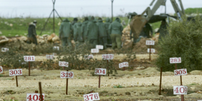
The National Campaign for Retrieval of the Bodies of Palestinian and Arab War Victims held by Israel today wrote an open letter to United Nations Secretary-General Antonio Guterres calling on him to take action ahead of the National Palestinian Day for the recovery of bodies of Palestinian war victims held by Israel for years and Israel’s disclosure of the fate of the missing.
“It is with grave concern that we direct this open letter to you,” wrote that National Campaign.
“Since 1967, Israel has applied an inconsistent policy of refusing to deliver the mortal remains of hundreds of Palestinian combatants to their families,” it said.
The dead were buried in what Israel refers to as “cemeteries for enemy combatants,” in mass clandestine graves located in areas designated as closed military zones and referred to as “cemeteries of numbers,” since the deceased are buried there anonymously with numbers etched onto metal placards attached to their corpses or remains.
“The systematically demeaning and negligent manner in which the remains are buried or dumped, coupled with the lack of proper registration by Israel’s military rabbinate, makes the process of locating and identifying the victims for potential exhumation an uphill task,” said the letter.
According to figures compiled by the Jerusalem Legal Aid Center (JLAC), Israel continues to hold the remains of 253 Arab and Palestinian war victims in these cemeteries while also refusing to acknowledge the fate of a further 68 who are missing.
“Israel's ongoing refusal to undertake the necessary process to identify those buried in the cemeteries of numbers violates United Nations Security Council Resolution 2474, which requires member states to prevent individuals from going missing as a result of armed conflict in territories under their jurisdiction.
Member states are required, inter alia, to produce and provide 'proper means of identification, including for members of armed forces, the establishment of national information bureaus upon the outbreak of an armed conflict, grave registration services and registers of deaths and ensuring accountability as appropriate in cases of missing persons’," it said.
“In addition to those languishing in the cemeteries of numbers, Israel has been holding captive the corpses of 51 Palestinians since 2016 under the pretext of using them as bargaining chips in a potential prisoner swap deal with Hamas,” said the letter.
Seventeen Palestinians of the total 51 whose bodies are held captive were killed in Gaza, 3 died in Israeli prisons, one is believed to have died under torture or ill-treatment, and one after spending 29 years in detention, while the rest were killed after alleged attacks, with suspicion that they were killed in extrajudicial execution when other means could have been used to detain them as evidence suggests.
The Campaign added: “The requirement of treating the dead with dignity and humanity is a universally recognized value and a norm of customary international law.
Codified in Article 16 of the 1907 Hague Convention, this norm is also protected by Article 15 of the First Geneva Convention, Article 18 of the Second Geneva Convention, and Article 16 of the Fourth Geneva Convention. It is further reiterated in Article 34(1) of Additional Protocol I.
“Moreover, due to its enormous impact on the families of the deceased, refusing to deliver the corpses for proper and dignified burial may amount to collective punishment prohibited under Article 50 of The Hague Regulations, Article 87 of the Third Geneva Convention, and Article 33 of the Fourth Geneva Convention.
“The Israeli practice of preventing families from burying their loved ones with peace and dignity also infringes upon their human rights to dignity, family life, religious freedom, equality, and the prohibition against cruel, inhuman and degrading treatment.”
The National Campaign said that in light of these “grave violations of international humanitarian law, international human rights law, and the UNSC Resolution,” it urged Guterres to raise this issue in his meeting with Israeli Prime Minister Benjamin Netanyahu during the upcoming session of the UN General Assembly, to call on Israel to unconditionally revoke the practice of withholding Palestinian corpses as bargaining chips; and demand that Israel respects its obligation to identify the remains of Palestinians held in secret cemeteries and return them to their families.
“It is with grave concern that we direct this open letter to you,” wrote that National Campaign.
“Since 1967, Israel has applied an inconsistent policy of refusing to deliver the mortal remains of hundreds of Palestinian combatants to their families,” it said.
The dead were buried in what Israel refers to as “cemeteries for enemy combatants,” in mass clandestine graves located in areas designated as closed military zones and referred to as “cemeteries of numbers,” since the deceased are buried there anonymously with numbers etched onto metal placards attached to their corpses or remains.
“The systematically demeaning and negligent manner in which the remains are buried or dumped, coupled with the lack of proper registration by Israel’s military rabbinate, makes the process of locating and identifying the victims for potential exhumation an uphill task,” said the letter.
According to figures compiled by the Jerusalem Legal Aid Center (JLAC), Israel continues to hold the remains of 253 Arab and Palestinian war victims in these cemeteries while also refusing to acknowledge the fate of a further 68 who are missing.
“Israel's ongoing refusal to undertake the necessary process to identify those buried in the cemeteries of numbers violates United Nations Security Council Resolution 2474, which requires member states to prevent individuals from going missing as a result of armed conflict in territories under their jurisdiction.
Member states are required, inter alia, to produce and provide 'proper means of identification, including for members of armed forces, the establishment of national information bureaus upon the outbreak of an armed conflict, grave registration services and registers of deaths and ensuring accountability as appropriate in cases of missing persons’," it said.
“In addition to those languishing in the cemeteries of numbers, Israel has been holding captive the corpses of 51 Palestinians since 2016 under the pretext of using them as bargaining chips in a potential prisoner swap deal with Hamas,” said the letter.
Seventeen Palestinians of the total 51 whose bodies are held captive were killed in Gaza, 3 died in Israeli prisons, one is believed to have died under torture or ill-treatment, and one after spending 29 years in detention, while the rest were killed after alleged attacks, with suspicion that they were killed in extrajudicial execution when other means could have been used to detain them as evidence suggests.
The Campaign added: “The requirement of treating the dead with dignity and humanity is a universally recognized value and a norm of customary international law.
Codified in Article 16 of the 1907 Hague Convention, this norm is also protected by Article 15 of the First Geneva Convention, Article 18 of the Second Geneva Convention, and Article 16 of the Fourth Geneva Convention. It is further reiterated in Article 34(1) of Additional Protocol I.
“Moreover, due to its enormous impact on the families of the deceased, refusing to deliver the corpses for proper and dignified burial may amount to collective punishment prohibited under Article 50 of The Hague Regulations, Article 87 of the Third Geneva Convention, and Article 33 of the Fourth Geneva Convention.
“The Israeli practice of preventing families from burying their loved ones with peace and dignity also infringes upon their human rights to dignity, family life, religious freedom, equality, and the prohibition against cruel, inhuman and degrading treatment.”
The National Campaign said that in light of these “grave violations of international humanitarian law, international human rights law, and the UNSC Resolution,” it urged Guterres to raise this issue in his meeting with Israeli Prime Minister Benjamin Netanyahu during the upcoming session of the UN General Assembly, to call on Israel to unconditionally revoke the practice of withholding Palestinian corpses as bargaining chips; and demand that Israel respects its obligation to identify the remains of Palestinians held in secret cemeteries and return them to their families.
3 sept 2019
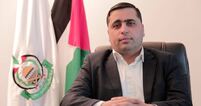
Hamas spokesman Abdul-Latif Qanu’a has described UN envoy Jason Greenblatt’s call for pressuring his Movement to release Israeli captive soldiers in Gaza as “blatant bias in favor of the Israeli occupation state.”
Spokesman Qanu’a said that Greenblatt ignored the suffering of thousands of Palestinian prisoners who have the right under international law to resist the occupation and receive humane treatment in Israeli jails.
Greenblatt this week addressed a letter to the UN, urging the international body to work on having the Israelis held in Gaza released, according to the Israeli media.
According to Israel’s Channel 12 News, Greenblatt, president Donald Trump's top Mideast negotiator, wrote the letter on the heels of a meeting with Leah and Simcha Goldin, the parents of Israeli soldier Hadar Goldin, one of the captive soldiers in Gaza.
Spokesman Qanu’a said that Greenblatt ignored the suffering of thousands of Palestinian prisoners who have the right under international law to resist the occupation and receive humane treatment in Israeli jails.
Greenblatt this week addressed a letter to the UN, urging the international body to work on having the Israelis held in Gaza released, according to the Israeli media.
According to Israel’s Channel 12 News, Greenblatt, president Donald Trump's top Mideast negotiator, wrote the letter on the heels of a meeting with Leah and Simcha Goldin, the parents of Israeli soldier Hadar Goldin, one of the captive soldiers in Gaza.
23 aug 2019
attempted a knife attack on Israeli police blocking one of the entrances to the Al-Aqsa Mosque (Dome of the Rock).
After trying to stab an Israeli police officer, Nassim was repeatedly shot and died at the scene; Hammouda was shot multiple times before being taken in custody. His current condition is unknown.
One Israeli police officer was treated for “light wounds”.
Video footage of the attack shows Nassim was initially shot in the leg, after which Israeli officers continued firing at him.
Mokafir believes that his son was executed, as he no longer posed a threat to the police, stating that “They [the police] could have stopped him without killing him.
These soldiers (police) are very well trained, they had…years of experience, they could control a little boy. They wanted to kill him.”
Immediately after Nassim’s attack, his father was arrested and held in a cell for 2.5 hours, after which he was interrogated by Shin Bet agents.
He was forced to watch the video of Israeli police repeatedly firing bullets into his son, whilst surrounded by Israeli Occupation Forces demanding that he identify Nassim.
Mokafih describes Nassim as a “…friendly, honest child. He was popular at school and had many friends.
He was in the 7th grade at [a branch of] the Al Aqsa school in Ezariyya, he had no social or psychological problems. He liked football and Internet.”
He remembers his son being deeply angered by the brutality of the IOF towards Palestinian worshipers at the Al Aqsa Mosque on the first day of Eid, one of the most important Muslim festivals of the year.
In particular, the images of women and children being violently assaulted deeply affected him. His father also maintains that his son acted alone, and the attack was not sanctioned or planned by any political party or movement.
After trying to stab an Israeli police officer, Nassim was repeatedly shot and died at the scene; Hammouda was shot multiple times before being taken in custody. His current condition is unknown.
One Israeli police officer was treated for “light wounds”.
Video footage of the attack shows Nassim was initially shot in the leg, after which Israeli officers continued firing at him.
Mokafir believes that his son was executed, as he no longer posed a threat to the police, stating that “They [the police] could have stopped him without killing him.
These soldiers (police) are very well trained, they had…years of experience, they could control a little boy. They wanted to kill him.”
Immediately after Nassim’s attack, his father was arrested and held in a cell for 2.5 hours, after which he was interrogated by Shin Bet agents.
He was forced to watch the video of Israeli police repeatedly firing bullets into his son, whilst surrounded by Israeli Occupation Forces demanding that he identify Nassim.
Mokafih describes Nassim as a “…friendly, honest child. He was popular at school and had many friends.
He was in the 7th grade at [a branch of] the Al Aqsa school in Ezariyya, he had no social or psychological problems. He liked football and Internet.”
He remembers his son being deeply angered by the brutality of the IOF towards Palestinian worshipers at the Al Aqsa Mosque on the first day of Eid, one of the most important Muslim festivals of the year.
In particular, the images of women and children being violently assaulted deeply affected him. His father also maintains that his son acted alone, and the attack was not sanctioned or planned by any political party or movement.
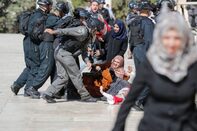
IOF assaulting Palestinian worshippers outside Al-Aqsa Mosque
On August 11th, the IOF used tear gas, rubber coated steel bullets and flash grenades to clear tens of thousands of Palestinian Muslims from the Al-Aqsa Mosque compound, to allow 1,300 Jews into the compound.
61 Palestinians were injured, 15 of which had to be hospitalized.
On August 11th, the IOF used tear gas, rubber coated steel bullets and flash grenades to clear tens of thousands of Palestinian Muslims from the Al-Aqsa Mosque compound, to allow 1,300 Jews into the compound.
61 Palestinians were injured, 15 of which had to be hospitalized.
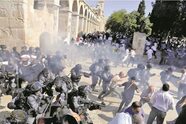
IOF violence inside the Al-Aqsa compound on the first day of Eid
4 days later, at 4:00PM in the afternoon, Nassim left the house without telling anyone where he was going. Later that night, Mokafih received word that his son was dead.
Israeli intelligence service Shin Bet continues to hold the body of Mokafih’s son. Mokafih’s requests for his son’s body have been repeatedly rejected on the grounds that the police investigation into the cause of death is still ongoing, even as footage of police shooting Nassim is widely shown in international media and online.
Police are also demanding Mokafih agree to preconditions regarding the funeral before returning his son’s body.
In December 2017, Israel’s High Court of Justice ruled that the bodies of alleged suspects cannot be held by the Israeli state, but 4 months later the Knessest passed a new law allowing bodies to be held until families agree to preconditions on funeral arrangements, effectively using the bodies of Palestinians killed by the IOF as bargaining chips.
Mokafih said the inability to give his son even a simple burial is causing tremendous emotional stress and grief for him and his family. Under Islamic burial traditions, burial should take place within 24 hours after death.
Burial with dignity and according to the religious laws of the deceased is a basic human right guaranteed by the Geneva Convention [pdf]. Even after the loss of a son, the Abu Roumi family is not only denied of their basic rights but forced to continue suffering without closure.
4 days later, at 4:00PM in the afternoon, Nassim left the house without telling anyone where he was going. Later that night, Mokafih received word that his son was dead.
Israeli intelligence service Shin Bet continues to hold the body of Mokafih’s son. Mokafih’s requests for his son’s body have been repeatedly rejected on the grounds that the police investigation into the cause of death is still ongoing, even as footage of police shooting Nassim is widely shown in international media and online.
Police are also demanding Mokafih agree to preconditions regarding the funeral before returning his son’s body.
In December 2017, Israel’s High Court of Justice ruled that the bodies of alleged suspects cannot be held by the Israeli state, but 4 months later the Knessest passed a new law allowing bodies to be held until families agree to preconditions on funeral arrangements, effectively using the bodies of Palestinians killed by the IOF as bargaining chips.
Mokafih said the inability to give his son even a simple burial is causing tremendous emotional stress and grief for him and his family. Under Islamic burial traditions, burial should take place within 24 hours after death.
Burial with dignity and according to the religious laws of the deceased is a basic human right guaranteed by the Geneva Convention [pdf]. Even after the loss of a son, the Abu Roumi family is not only denied of their basic rights but forced to continue suffering without closure.
6 aug 2019
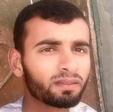
Hani Hassan Abu Salah
Former Palestinian prisoners especially those who were freed in the prisoner swap deal with the Israeli regime in 2011, joined families of Palestinian prisoners in their sit-in at the Red Cross office in Gaza to slam Israel’s refusal to handover the bodies of fallen Palestinians.
On Thursday, Israeli forces shot and killed Hani Hassan Abu Salah east of town of Khan Yunis in the southern Gaza Strip and kept his body.
The Israeli regime currently keeps the remains of some 250 fallen Palestinians in morgues and secret burial sites also known as cemeteries.
It's widely believed that Tel Aviv will likely use the bodies of Palestinian martyrs as bargaining chips to release Israeli soldiers reportedly held by resistance factions in the Gaza Strip.
Observers say that keeping bodies of Palestinian victims is a gross violation of common decency, which is of little concern to a racist entity like Israel.
According to human rights organizations, holding bodies and remains of the dead contravenes the principles of international humanitarian law.
The illegal Israeli decision also complicates the possibility of holding a new prisoner swap deal between Hamas and the Israeli regime.
Former Palestinian prisoners especially those who were freed in the prisoner swap deal with the Israeli regime in 2011, joined families of Palestinian prisoners in their sit-in at the Red Cross office in Gaza to slam Israel’s refusal to handover the bodies of fallen Palestinians.
On Thursday, Israeli forces shot and killed Hani Hassan Abu Salah east of town of Khan Yunis in the southern Gaza Strip and kept his body.
The Israeli regime currently keeps the remains of some 250 fallen Palestinians in morgues and secret burial sites also known as cemeteries.
It's widely believed that Tel Aviv will likely use the bodies of Palestinian martyrs as bargaining chips to release Israeli soldiers reportedly held by resistance factions in the Gaza Strip.
Observers say that keeping bodies of Palestinian victims is a gross violation of common decency, which is of little concern to a racist entity like Israel.
According to human rights organizations, holding bodies and remains of the dead contravenes the principles of international humanitarian law.
The illegal Israeli decision also complicates the possibility of holding a new prisoner swap deal between Hamas and the Israeli regime.
3 july 2019
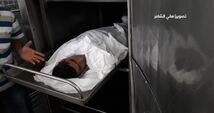
The Israeli occupation authorities on Tuesday returned the body of a Palestinian child who was shot by Israeli forces three months ago near the border east of the southern Gaza Strip city of Rafah.
The body of Ishaq Shtewi, 16, was handed over to his family and al-Mezan Center for Human Rights through Beit Hanoun (Erez) crossing.
Shtewi died on 14 April after he succumbed to gunshot wounds he sustained earlier in the same month when he was arrested along with other Palestinian boys on the border.
The Israeli occupation authorities are currently holding the bodies of 260 Palestinian martyrs, four of whom are under the age of 18.
The body of Ishaq Shtewi, 16, was handed over to his family and al-Mezan Center for Human Rights through Beit Hanoun (Erez) crossing.
Shtewi died on 14 April after he succumbed to gunshot wounds he sustained earlier in the same month when he was arrested along with other Palestinian boys on the border.
The Israeli occupation authorities are currently holding the bodies of 260 Palestinian martyrs, four of whom are under the age of 18.
2 july 2019
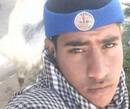
The Israeli Authorities have decided, Monday, to release the corpse of a Palestinian teen, identified as Ishaq Abdul-Mo’ti Eshteiwi, 16, who was killed by Israeli army fire in April of this year.
The decision came after the al-Mezan Center for Human Rights filed an appeal with Israeli courts demanding the transfer of the teen’s corpse to his family.
Yahia Mohareb, a lawyer with al-Mezan, said that the center filed the appeal on April 15th, asking for allowing the transfer of the slain teen to his family for burial.
A senior official at the Palestinian District Coordination Office said, Monday, that Israel has informed them that the Ishaq’s corpse will be transferred on Tuesday, July 2d.
Ishaq was from Rafah, in the southern part of the Gaza Strip; he was shot with several live rounds in the abdomen, and the upper extremities, after crossing the perimeter fence.
After shooting him, the soldiers took him to a hospital, and abducted Hamad Mousa al-Bahabsa, 16, and Mansour Fawwaz ash-Shawi, 16. Ash-Shawi was shot in his left leg, and both teens were later released and sent back to the Gaza Strip.
It is worth mentioning that Israel is still holding the copses of 12 Palestinians, who were killed during the ongoing Great Return March processions in the Gaza Strip, after they crossed the perimeter fence, in the Gaza Strip.
The decision came after the al-Mezan Center for Human Rights filed an appeal with Israeli courts demanding the transfer of the teen’s corpse to his family.
Yahia Mohareb, a lawyer with al-Mezan, said that the center filed the appeal on April 15th, asking for allowing the transfer of the slain teen to his family for burial.
A senior official at the Palestinian District Coordination Office said, Monday, that Israel has informed them that the Ishaq’s corpse will be transferred on Tuesday, July 2d.
Ishaq was from Rafah, in the southern part of the Gaza Strip; he was shot with several live rounds in the abdomen, and the upper extremities, after crossing the perimeter fence.
After shooting him, the soldiers took him to a hospital, and abducted Hamad Mousa al-Bahabsa, 16, and Mansour Fawwaz ash-Shawi, 16. Ash-Shawi was shot in his left leg, and both teens were later released and sent back to the Gaza Strip.
It is worth mentioning that Israel is still holding the copses of 12 Palestinians, who were killed during the ongoing Great Return March processions in the Gaza Strip, after they crossed the perimeter fence, in the Gaza Strip.
30 june 2019
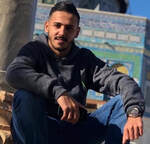
Israeli soldiers invaded, on Saturday evening, the al-‘Isawiya town, in occupied Jerusalem, and removed the mourning tent of Mohammad Samir Obeid, 21, who was killed by the army, Thursday.
Mohammad Abu al-Hummus, a member of the Follow-Up Committee in al-‘Isawiya, said the soldiers attacked many Palestinians in the tent, and surrounding areas, and tore posters of slain young man.
He added that the soldiers caused many injuries among the Palestinians, including the children and the elderly.
The soldiers also invaded Silwan town, Shu’fat town, and Shu’fat refugee camp, in Jerusalem, and fired live rounds, gas bombs, concussion grenades, and rubber-coated steel bullets at the protesters.
The invasion led to massive protests, and the Palestinians hurled stones at the soldiers, in addition to countering their invasion with fireworks and Molotov cocktails, while the army fired live rounds, rubber-coated steel bullets and gas bombs.
Also Saturday, the soldiers invaded and ransacked Obeid’s home, tore his posters and removed Palestinian flags from the buildings.
It is worth mentioning that, after killing Obeid, the soldiers took his corpse, and did not return it to the family for burial. video video video video
Mohammad Abu al-Hummus, a member of the Follow-Up Committee in al-‘Isawiya, said the soldiers attacked many Palestinians in the tent, and surrounding areas, and tore posters of slain young man.
He added that the soldiers caused many injuries among the Palestinians, including the children and the elderly.
The soldiers also invaded Silwan town, Shu’fat town, and Shu’fat refugee camp, in Jerusalem, and fired live rounds, gas bombs, concussion grenades, and rubber-coated steel bullets at the protesters.
The invasion led to massive protests, and the Palestinians hurled stones at the soldiers, in addition to countering their invasion with fireworks and Molotov cocktails, while the army fired live rounds, rubber-coated steel bullets and gas bombs.
Also Saturday, the soldiers invaded and ransacked Obeid’s home, tore his posters and removed Palestinian flags from the buildings.
It is worth mentioning that, after killing Obeid, the soldiers took his corpse, and did not return it to the family for burial. video video video video

